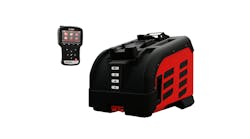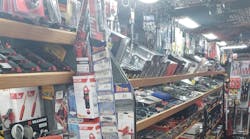The automotive industry is constantly changing. As new technology comes into play, technicians must adapt — purchasing new tools, receiving more training, and educating themselves on what’s to come. But it’s not only the technicians that must adapt, it’s the mobile tool dealers, too.
Todd Smith has been a Mac Tools distributor for 31 years. During his time in the industry, he’s seen many changes take place. Most notably, at the body and fender shops he services, scan tools have become a product of interest.
Recently, a customer at one of these shops asked Smith what he knew about pre- and post-scans as these are now required by insurance companies. Smith notes how a few years back a conversation such as this would never have taken place. And because his customers are mainly heavy duty truck shops, along with some automotive and body and fender shops, he, unfortunately, had to tell his customer he didn’t know much.
However, that didn’t stop Smith from getting the information his customer requested. Smith called up Mac’s tech guy to get a better understanding of their scan tools’ capabilities and then requested that a local representative who was more knowledgeable on scan tools come out to show them to his customer. This way the customer was able to see all the scan tools Mac has to offer and was able to choose the scanner that best fit their shop’s needs.
When these kinds of changes in the industry happen, it’s okay not to always have the answers, but that doesn’t mean giving up. If Smith hadn’t worked to educate himself and find someone to speak with his customer, the sale would have been lost. Instead, he’s adapted to the situation and is preparing himself for the next time it comes up.
Changes in the collision industry
In 2015, Ford released an all-aluminum F-150 — the catalyst for a major change in the collision industry. Though other vehicles were using aluminum before this, Ford was the biggest manufacturer to do this and do it with a major selling vehicle, says Eric Sponhaltz, national sales and marketing manager at H&S Autoshot.
With mixed metals brought in to ensure vehicles abided by the Environmental Protection Agency’s mile per gallon regulations, as well as to make vehicles lighter, faster, and smaller, collision shops were forced to find solutions fast or wind up out of business. According to Jason Mahugh, director of engineering and technical services at Forney Industries, the aluminum and high-strength steels going into the vehicles call for different tools and equipment when being cut or welded.
These changes coupled with the new technology of electric vehicles and ADAS have caused great shifts in the collision industry, blurring the lines between it and the automotive repair industry. In the past, notes Mike Croker, global repair and training product manager for Chief Collision Technology, the line between collision and auto repair was fairly black and white. But with all the new technology and materials being used, the collision side has to have an understanding of repairs that would have traditionally been mechanical processes.
On top of a wider range of tools and equipment needed, Croker says, comes a need for technicians who know how to run that equipment and understand how to perform those procedures if the collision shops want to keep all their repairs inside their own shops. Once a repair leaves their shop, it’s out of their control. It’s no longer on their timeline, and they can’t be sure the repair is being done properly.
So, how do the collision shops keep their work in-house? Training.
Training
“You can never have enough (training), and what I think people can’t forget is that you’re never going to stop learning because when you stop learning, you’re done,” Croker says.
As the manager of Chief’s training department, Croker knows how essential training is to ensuring repairs are right. If shops aren’t constantly training, something is going to go wrong. A vehicle could be repaired incorrectly, and that’s “really frightening,” Croker notes.
Figuring out training and certifications can seem overwhelming with all the different options out there, but Sponhaltz says, I-CAR, an entity for training and curriculum in the collision industry, has created procedures, testing, and certifications for technicians and shops to help them navigate all these changes.
Of course, if something is OEM specific, then the shops may need to go to that manufacturer for training or certification. On the bright side, Sponhaltz notes, many vehicle manufacturers have taken a “common sense” approach to repairs, meaning that repairs can be done based on the capabilities of the shop’s tools, not on what brand of tool they use.
Get inside the customer’s head
When attempting to make a sale, it’s important to understand where the customer’s head is at — what are they looking to get out of the product? In turn, this will help inform what tools and equipment, you’ll need to keep in stock on your truck.
Your customers have many factors to consider when making a purchase and will likely have many questions for you.
“When you're asked a question about something, you need to follow up on it,” Mac distributor Smith says. “They don't want to have to go searching for that stuff; that's why they have their tool guy to get the information rounded up and find the best options. From there, they can pick what they want, what works the best for them.”
As their mobile tool distributor, it’s your job to collect as much information from the customer as possible to present them with solutions to fit their needs. For collision repair tools and equipment, Sponhaltz recommends looking for versatility to maximize their investment.
For instance, H&S Autoshot offers a stud gun that welds both aluminum and steel called the Dual-Spotter. All technicians have to do is change the nose of the tool to prevent cross-contamination and they’ve got two tools in one.
A consideration to keep in mind if your customer is looking for a welder is the type of metal they are working on. With the construction of vehicles including aluminum and high strength steels, it’s likely they’ll need more advanced equipment than just a 12” to 15” welding torch, notes Forney’s Mahugh. An attachment like an aluminum stool gun may be necessary.
Also, Mahugh warns that shops probably don’t need as big and expensive of welding and cutting machines as they may think. He explains that Forney makes a 120V welding machine and cutting machine, and both can cut up to 1/4’, which should be all a technician needs when working on a vehicle. Of course, there are always exceptions to this, so be sure to ask your customer exactly what they need the machine to do.
Additionally, your customers should keep in mind the service and support available from the manufacturer of the product they purchase.
“Are you buying it from a reputable company? Have they been around for a while? Do they have multi-level support functions? So not only the guy showing up to help sell it to you, but does he have a guy that can train the equipment?” Croker says.
Selling collision tools and equipment
Demos are a great way for mobile tool dealers to show customers how a product works and what features it possesses, but not all products can be easily demoed.
Many products essential to collision repair, such as welders, aren’t necessarily equipment a mobile tool distributor will have extensive knowledge on, so Croker recommends distributors contact the manufacturer. This way the company can send a product expert to demo the tool and answer any questions the distributor couldn’t. Understandably, Croker notes, distributors may feel wary of doing this because they don’t want to lose their sale, but a bad demo could just as easily ruin the sale. Also, if you’re working with a company like Chief, they will have processes in place to protect your sale.
Sponhaltz advises distributors not to make assumptions. Many times, you’ll walk into a shop and see that they have this equipment or that tool and figure they have it covered, but you may not be getting the whole story. They could be unhappy with the product they currently have, but you’ll never know if you don’t ask. Sponhaltz suggests having a conversation like this with your customer.
“’I see you have an aluminum dent puller over there. Mr. Customer, can you tell me a little bit about that? Is it meeting all of your needs?’ Sometimes the answer is yes. Sometimes the answer is no, and that’s an opportunity to bring some different solutions,” he says.
But the most important advice for making the sale, Smith says, is showing up and taking care of your customers. Just as he did for that customer who asked about scan tools. Even if Smith didn’t have all the answers, he found a way to get his customer what they needed.
“I guess this is age-old, but I really think the trick is to be there every week and ask them how you can take care of them,” Smith says. “Let them tell you what they need and go from there.”



